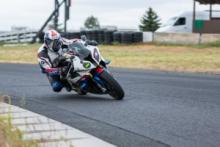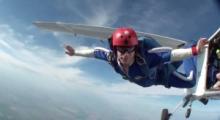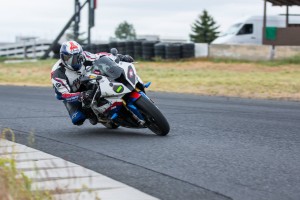User login
Hospitalist Jaime Upegui, MD, division president at Apogee Physicians in Coeur d’Alene, Idaho, knows exactly what he wants to do when he retires years from now: sell everything he owns and ride his motorcycle around the world.
Dr. Upegui is a modern-day explorer who enjoys making the journey as much as getting to the destination. Riding is his personal form of yoga, a meditative experience that demands he stay in the moment and allows him to escape life’s daily frustrations. Ever since he started riding motorcycles at age five, he’s been hooked and has no plans of shifting into neutral.
Driven by Change
Every day at work, Dr. Upegui, an internal medicine specialist, helps hospitalists thrive in a changing medical world where they’re constantly being pushed and pulled in multiple directions. “It’s an exciting career that’s full of unexpected changes,” he says. “I work hard every day on building great teams that produce stellar results.”
He brings that same level of enthusiasm to his after-work activities, which include skydiving, tango dancing, scuba diving, snowboarding, and rock climbing. His passion for change and adventure stems from his childhood.
Listen to more of our interview with Dr. Upegui.
Dr. Upegui was born in Colombia and raised predominantly in the cities of Cali and Medellín. His mother, Rocio, was a painter and ballet dancer; his father, Jaime Sr., was a poet and musician. He spent most of his childhood with his mother, who moved frequently in search of new inspirations. During his childhood, he attended 13 different schools and lived in more than 30 different homes in the U.S., Colombia, and Spain. In 2003, he finished medical school, graduating from Universidad Pontificia Bolivariana in Medellín. He worked as an attending physician in the emergency department there for three years before moving to New York City to complete his residency in internal medicine at St. Luke’s–Roosevelt Hospital Center.
Throughout medical school and his residency, Dr. Upegui’s personal interests extended beyond motorcycling to skydiving and tango dancing, a skill he initially learned to love from his father. Dr. Upegui says he enjoys nothing more than learning, so he’s attracted to activities that require a high degree of training or technical expertise.
“I like to do things that make me feel like I’m proficient at something that’s difficult,” he says.
He vividly remembers the first time he jumped out of a plane, in 2002.
“It was thrilling, it was exciting, it was ego-boosting, it was self-gratifying, it was an adrenaline rush,” Dr. Upegui explains, adding that he taught English to the owner of the skydiving center in Colombia in exchange for free jumps. “The most exciting part is the decision to take the leap. That critical moment still gives me butterflies.”
Over the next six years, he jumped approximately 150 times, then stopped for roughly seven years to handle the demands of school and work, and to avoid the actual cost of skydiving, which is pricey at roughly a few hundred dollars per jump. But, over the years, he missed it, so he resumed skydiving earlier this year.
In between, he learned to tango through private and group lessons. Last year, he traveled to Buenos Aires, Argentina, for an intensive weeklong course and an international tango gathering. He also travels to “milongas,” get-togethers for professional and student tango dancers that are held in various cities worldwide.
“Tango has two core elements: showing your intention to move forward and allowing your partner to accept the invitation to follow your lead,” he says. “It’s a beautiful combination of assertiveness, determination, and then negotiation, followed by permission to proceed, depending upon how the conversation is going during the dance.”
No Regrets
Procrastination is not a familiar word to Dr. Upegui.
“The time frame between something that I want to do and [actually] doing it is very short,” he says. “If I want to do something, I just look at how I can get to it as soon as it’s available.”
Motorcycling ranks as his number one passion. Last year, he completed a 7,000-mile trip without taking any time off from his current job, which requires him to lead, manage, and often meet with hospitalist teams nationwide. He traveled via back roads on weekends to a major city, left his bike at the airport, and then hopped on a plane to wherever he needed to be for work. Instead of flying home for the weekend, he’d return to the airport to pick up his bike and travel to the next city he wanted to visit, which could be 1,000 miles away.
“The cool thing about the road is that random people help you,” he says. “The hotels would keep my clothes and luggage, and airport parking employees would help me park my motorcycle in a safe place and keep my helmet in their office.”
Dr. Upegui says childhood experiences that focused on momentum and movement laid the foundation for his mobile and adventuresome lifestyle. Movement, variability, and change have become the guiding factors in his life. Perhaps that’s why he chose to be a hospitalist. Among the youngest fields in medicine, the specialty is always growing, changing, and evolving.
“If you take any change in life as just a new stage of a new moment and you just perform your best in this current situation, then that will allow you to always be flexible to what’s happening in front of you,” Dr. Upegui says. “I love my work, family, Apogee, and the opportunities I have had. I could die completely satisfied today, knowing that I’ve done the best I could and searched for happiness every day.”
Hospitalist Jaime Upegui, MD, division president at Apogee Physicians in Coeur d’Alene, Idaho, knows exactly what he wants to do when he retires years from now: sell everything he owns and ride his motorcycle around the world.
Dr. Upegui is a modern-day explorer who enjoys making the journey as much as getting to the destination. Riding is his personal form of yoga, a meditative experience that demands he stay in the moment and allows him to escape life’s daily frustrations. Ever since he started riding motorcycles at age five, he’s been hooked and has no plans of shifting into neutral.
Driven by Change
Every day at work, Dr. Upegui, an internal medicine specialist, helps hospitalists thrive in a changing medical world where they’re constantly being pushed and pulled in multiple directions. “It’s an exciting career that’s full of unexpected changes,” he says. “I work hard every day on building great teams that produce stellar results.”
He brings that same level of enthusiasm to his after-work activities, which include skydiving, tango dancing, scuba diving, snowboarding, and rock climbing. His passion for change and adventure stems from his childhood.
Listen to more of our interview with Dr. Upegui.
Dr. Upegui was born in Colombia and raised predominantly in the cities of Cali and Medellín. His mother, Rocio, was a painter and ballet dancer; his father, Jaime Sr., was a poet and musician. He spent most of his childhood with his mother, who moved frequently in search of new inspirations. During his childhood, he attended 13 different schools and lived in more than 30 different homes in the U.S., Colombia, and Spain. In 2003, he finished medical school, graduating from Universidad Pontificia Bolivariana in Medellín. He worked as an attending physician in the emergency department there for three years before moving to New York City to complete his residency in internal medicine at St. Luke’s–Roosevelt Hospital Center.
Throughout medical school and his residency, Dr. Upegui’s personal interests extended beyond motorcycling to skydiving and tango dancing, a skill he initially learned to love from his father. Dr. Upegui says he enjoys nothing more than learning, so he’s attracted to activities that require a high degree of training or technical expertise.
“I like to do things that make me feel like I’m proficient at something that’s difficult,” he says.
He vividly remembers the first time he jumped out of a plane, in 2002.
“It was thrilling, it was exciting, it was ego-boosting, it was self-gratifying, it was an adrenaline rush,” Dr. Upegui explains, adding that he taught English to the owner of the skydiving center in Colombia in exchange for free jumps. “The most exciting part is the decision to take the leap. That critical moment still gives me butterflies.”
Over the next six years, he jumped approximately 150 times, then stopped for roughly seven years to handle the demands of school and work, and to avoid the actual cost of skydiving, which is pricey at roughly a few hundred dollars per jump. But, over the years, he missed it, so he resumed skydiving earlier this year.
In between, he learned to tango through private and group lessons. Last year, he traveled to Buenos Aires, Argentina, for an intensive weeklong course and an international tango gathering. He also travels to “milongas,” get-togethers for professional and student tango dancers that are held in various cities worldwide.
“Tango has two core elements: showing your intention to move forward and allowing your partner to accept the invitation to follow your lead,” he says. “It’s a beautiful combination of assertiveness, determination, and then negotiation, followed by permission to proceed, depending upon how the conversation is going during the dance.”
No Regrets
Procrastination is not a familiar word to Dr. Upegui.
“The time frame between something that I want to do and [actually] doing it is very short,” he says. “If I want to do something, I just look at how I can get to it as soon as it’s available.”
Motorcycling ranks as his number one passion. Last year, he completed a 7,000-mile trip without taking any time off from his current job, which requires him to lead, manage, and often meet with hospitalist teams nationwide. He traveled via back roads on weekends to a major city, left his bike at the airport, and then hopped on a plane to wherever he needed to be for work. Instead of flying home for the weekend, he’d return to the airport to pick up his bike and travel to the next city he wanted to visit, which could be 1,000 miles away.
“The cool thing about the road is that random people help you,” he says. “The hotels would keep my clothes and luggage, and airport parking employees would help me park my motorcycle in a safe place and keep my helmet in their office.”
Dr. Upegui says childhood experiences that focused on momentum and movement laid the foundation for his mobile and adventuresome lifestyle. Movement, variability, and change have become the guiding factors in his life. Perhaps that’s why he chose to be a hospitalist. Among the youngest fields in medicine, the specialty is always growing, changing, and evolving.
“If you take any change in life as just a new stage of a new moment and you just perform your best in this current situation, then that will allow you to always be flexible to what’s happening in front of you,” Dr. Upegui says. “I love my work, family, Apogee, and the opportunities I have had. I could die completely satisfied today, knowing that I’ve done the best I could and searched for happiness every day.”
Hospitalist Jaime Upegui, MD, division president at Apogee Physicians in Coeur d’Alene, Idaho, knows exactly what he wants to do when he retires years from now: sell everything he owns and ride his motorcycle around the world.
Dr. Upegui is a modern-day explorer who enjoys making the journey as much as getting to the destination. Riding is his personal form of yoga, a meditative experience that demands he stay in the moment and allows him to escape life’s daily frustrations. Ever since he started riding motorcycles at age five, he’s been hooked and has no plans of shifting into neutral.
Driven by Change
Every day at work, Dr. Upegui, an internal medicine specialist, helps hospitalists thrive in a changing medical world where they’re constantly being pushed and pulled in multiple directions. “It’s an exciting career that’s full of unexpected changes,” he says. “I work hard every day on building great teams that produce stellar results.”
He brings that same level of enthusiasm to his after-work activities, which include skydiving, tango dancing, scuba diving, snowboarding, and rock climbing. His passion for change and adventure stems from his childhood.
Listen to more of our interview with Dr. Upegui.
Dr. Upegui was born in Colombia and raised predominantly in the cities of Cali and Medellín. His mother, Rocio, was a painter and ballet dancer; his father, Jaime Sr., was a poet and musician. He spent most of his childhood with his mother, who moved frequently in search of new inspirations. During his childhood, he attended 13 different schools and lived in more than 30 different homes in the U.S., Colombia, and Spain. In 2003, he finished medical school, graduating from Universidad Pontificia Bolivariana in Medellín. He worked as an attending physician in the emergency department there for three years before moving to New York City to complete his residency in internal medicine at St. Luke’s–Roosevelt Hospital Center.
Throughout medical school and his residency, Dr. Upegui’s personal interests extended beyond motorcycling to skydiving and tango dancing, a skill he initially learned to love from his father. Dr. Upegui says he enjoys nothing more than learning, so he’s attracted to activities that require a high degree of training or technical expertise.
“I like to do things that make me feel like I’m proficient at something that’s difficult,” he says.
He vividly remembers the first time he jumped out of a plane, in 2002.
“It was thrilling, it was exciting, it was ego-boosting, it was self-gratifying, it was an adrenaline rush,” Dr. Upegui explains, adding that he taught English to the owner of the skydiving center in Colombia in exchange for free jumps. “The most exciting part is the decision to take the leap. That critical moment still gives me butterflies.”
Over the next six years, he jumped approximately 150 times, then stopped for roughly seven years to handle the demands of school and work, and to avoid the actual cost of skydiving, which is pricey at roughly a few hundred dollars per jump. But, over the years, he missed it, so he resumed skydiving earlier this year.
In between, he learned to tango through private and group lessons. Last year, he traveled to Buenos Aires, Argentina, for an intensive weeklong course and an international tango gathering. He also travels to “milongas,” get-togethers for professional and student tango dancers that are held in various cities worldwide.
“Tango has two core elements: showing your intention to move forward and allowing your partner to accept the invitation to follow your lead,” he says. “It’s a beautiful combination of assertiveness, determination, and then negotiation, followed by permission to proceed, depending upon how the conversation is going during the dance.”
No Regrets
Procrastination is not a familiar word to Dr. Upegui.
“The time frame between something that I want to do and [actually] doing it is very short,” he says. “If I want to do something, I just look at how I can get to it as soon as it’s available.”
Motorcycling ranks as his number one passion. Last year, he completed a 7,000-mile trip without taking any time off from his current job, which requires him to lead, manage, and often meet with hospitalist teams nationwide. He traveled via back roads on weekends to a major city, left his bike at the airport, and then hopped on a plane to wherever he needed to be for work. Instead of flying home for the weekend, he’d return to the airport to pick up his bike and travel to the next city he wanted to visit, which could be 1,000 miles away.
“The cool thing about the road is that random people help you,” he says. “The hotels would keep my clothes and luggage, and airport parking employees would help me park my motorcycle in a safe place and keep my helmet in their office.”
Dr. Upegui says childhood experiences that focused on momentum and movement laid the foundation for his mobile and adventuresome lifestyle. Movement, variability, and change have become the guiding factors in his life. Perhaps that’s why he chose to be a hospitalist. Among the youngest fields in medicine, the specialty is always growing, changing, and evolving.
“If you take any change in life as just a new stage of a new moment and you just perform your best in this current situation, then that will allow you to always be flexible to what’s happening in front of you,” Dr. Upegui says. “I love my work, family, Apogee, and the opportunities I have had. I could die completely satisfied today, knowing that I’ve done the best I could and searched for happiness every day.”


